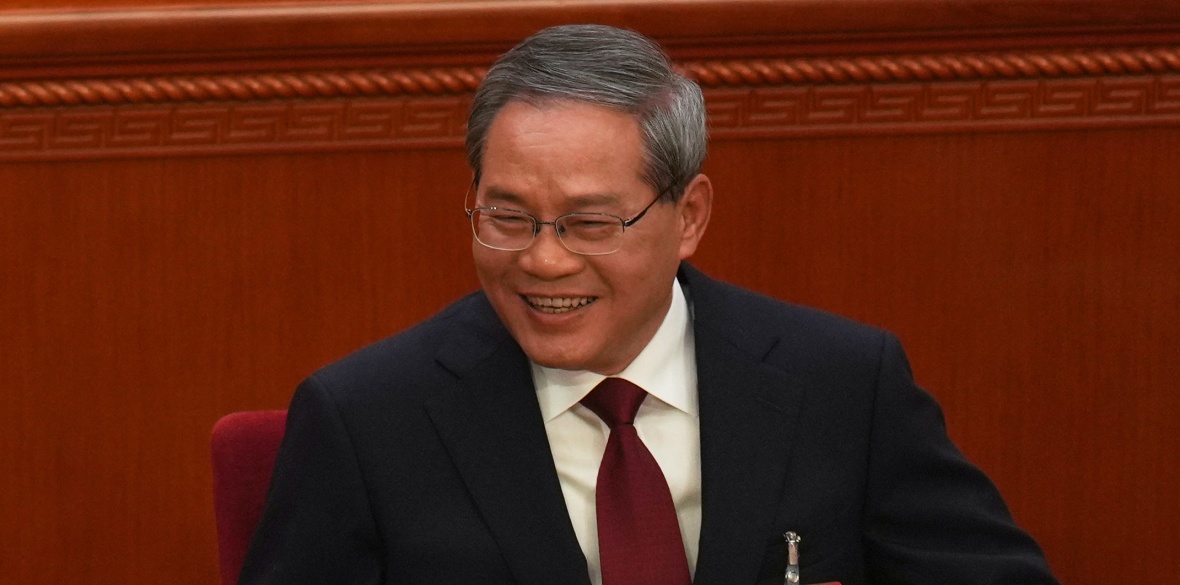This is the last article you can read this month
You can read more article this month
You can read more articles this month
Sorry your limit is up for this month
Reset on:
Please help support the Morning Star by subscribing here
THE recently concluded “Two Sessions” in Beijing have drawn global attention. Against the backdrop of a sluggish global economic recovery and mounting risks and challenges, the international community eagerly sought insights, opportunities, and inspiration from this year’s sessions on how China will advance high-quality development to help alleviate global economic woes.
The Chinese government’s work report, which set an economic growth target of around 5 per cent for the year, has garnered significant global attention. In a world grappling with economic stagnation, how will China contribute to global development?
In delivering the report, Chinese Premier Li Qiang emphasised the paramount importance of high-quality development and reaffirmed China’s unwavering commitment to opening up. This message sends a strong and positive signal to a world struggling with economic uncertainty and sluggish recovery.
Amid complex and volatile international dynamics, the report outlined a clear roadmap for China’s expansion of high-level opening-up, stabilisation of foreign trade and investment, and deepening of international co-operation. It reinforced China’s role as a “stabiliser” for the global economy and underscored its determination to uphold open co-operation for shared development and prosperity.
Despite rising trade protectionism and heightened international economic frictions, China remains steadfast in its commitment to openness. Last year, China fully lifted restrictions on foreign investment in the manufacturing sector — a landmark move that demonstrates its dedication to fostering a more inclusive and attractive business environment for global investors.
The government’s 2025 agenda further highlights its resolve to leverage opening up as a driver of reform, development, and stability, unlocking new opportunities for both domestic and international investors.
Despite challenges, China has set a GDP growth target of around 5 per cent. Achieving this goal necessitates maintaining stable economic operations while addressing potential difficulties. The 5 per cent target reflects the government’s pragmatic approach, acknowledging the shift from rapid growth to a focus on high-quality, sustainable development.
This year’s work report also prioritised technological innovation as a key driver of China’s long-term economic vitality. To remain competitive in a fast-evolving global economy, China must transition from an investment-driven model to one that integrates technological and industrial innovation.
Sir Sherard Cowper-Coles, chairman of the China-Britain Business Council, noted that the work report sends a clear message: Chinese policymakers are confident in achieving the 5 per cent growth target by 2025.
China’s economic transformation is pivotal for global economic stability. While proactive fiscal policies and prudent monetary measures aim to spur growth, parallel efforts are being made to mitigate risks in key sectors, promote green development, and ensure sustainable growth.
Furthermore, China is climbing the global value chain. By nurturing new productive forces, it is transitioning from labour-intensive industries to an innovation-driven advanced manufacturing sector. Notably, Chinese private enterprises are playing a crucial role in this transformation.
The 2025 targets and recent economic trends reaffirm China’s indispensable role as a “stabiliser” and “engine” of global development.
As China opens for more trade, stabilises foreign investment, and deepens global co-operation, it not only meets its own development needs but also bolsters global economic confidence and stability.
In a world weary of uncertainty and protectionism, China’s commitment to openness serves as a strong signal of confidence and responsibility. Moving steadily toward new horizons, China will continue steering the global economy toward greater inclusiveness, openness, and connectivity, creating shared opportunities for all nations.
Recent volatility in US policy toward Ukraine has posed serious challenges for Europe. Donald Trump’s reluctance to guarantee European security has forced Europe to confront the reality that reliance on US protection comes at a cost.
Europe’s long-standing dependence on Nato and US security has been a key factor in tensions, as Russia perceives Nato’s eastward expansion as a threat and strongly opposes Ukraine’s membership.
British Prime Minister Keir Starmer has acknowledged that a prolonged conflict could have severe global repercussions.
For Europe, the time has come to break free from constraints and take charge of its own security and destiny, rather than perpetuating a path of endless conflict.
China stands as an optimal partner for Europe. Strengthening China-EU co-operation is of vital importance. As major trading partners, a robust relationship is crucial for mutual prosperity. Amid global challenges such as economic recovery and climate change, deeper collaboration is imperative.
China and the EU can enhance co-operation in renewable energy, green technology, and infrastructure, generating synergies that benefit both economies and contribute to global sustainability.
Moreover, the Belt and Road Initiative (BRI) is increasingly aligning with Europe’s development strategies. China will continue advancing the BRI, deepening co-operation with Europe in infrastructure, connectivity, and industrial capacity to achieve mutual benefits.
At last week’s foreign policy press conference during the Third Session of the 14th National People’s Congress, it was revealed that over the past 50 years, China-Europe co-operation has flourished, with the China-Europe Railway Express surpassing 100,000 trips, cementing its role as a “golden corridor” linking Asia and Europe. This milestone underscores the vigour and potential of China-EU co-operation, with the railway serving as a vital bond that unites the two economic powerhouses across multiple dimensions.
Additionally, cultural exchanges are deepening. With rich histories and civilisations, China and Europe can strengthen collaboration in education, culture, and tourism, enhancing mutual understanding and friendship while laying a stronger social foundation for bilateral relations.
Ultimately, China-EU co-operation holds immense potential, particularly in an increasingly interconnected world. By fostering mutual respect, understanding, innovation, and dialogue, China and Europe can jointly tackle pressing global challenges and build a brighter future together.
Liang Tao is a reporter with China Media Group Europe.







